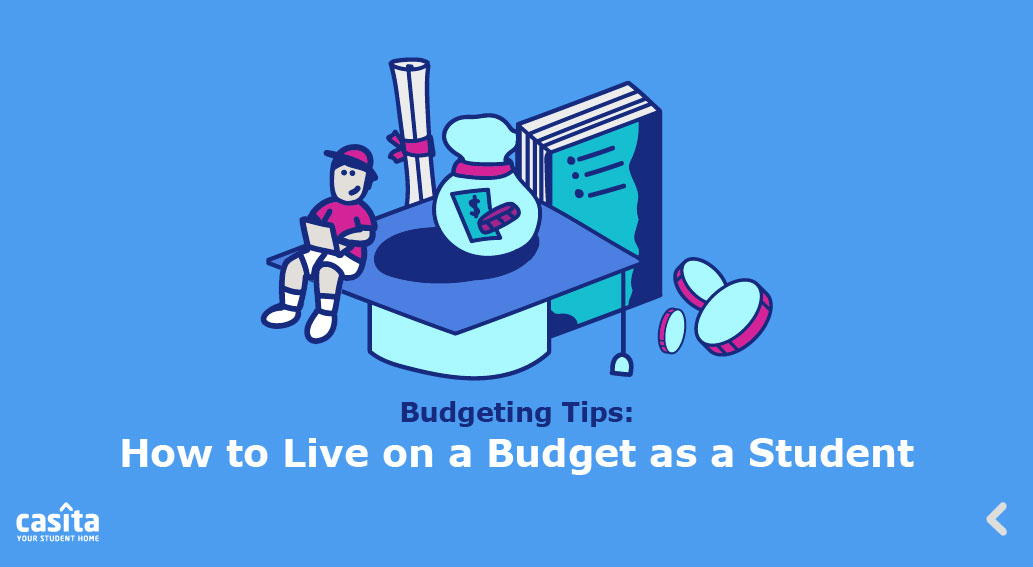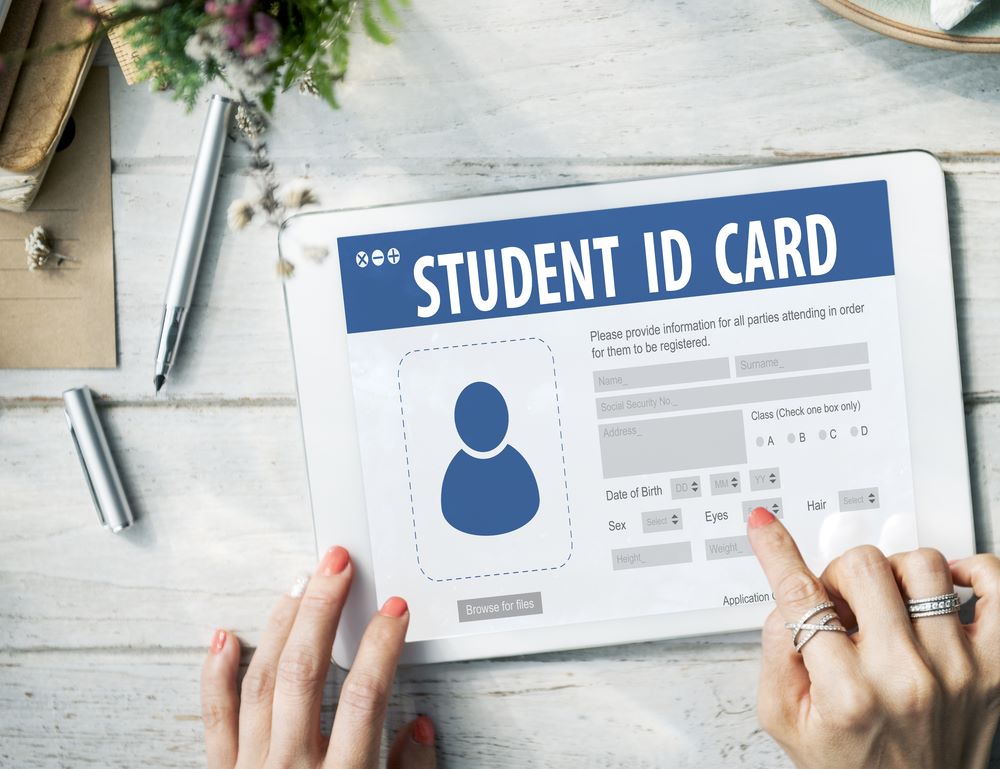Budgeting Tips: How to Live on a Budget as a Student
Tips and Advice
Student Finance
26 June, 2023
|
8 mins read
By Reem Mohamed
Share

Budgeting Tips: How to Live on a Budget as a Student
Tips and Advice
Student Finance
26 June, 2023
|
8 mins read

By Reem Mohamed
Share
What is the cheapest way to live alone? Can I survive on a budget? What makes a successful budgeting system? These, and many more, are questions that you find yourself asking as a university student trying their best to manage their finances and be able to afford everything they need on a student budget.
Living on a student budget might be challenging, but it is certainly not impossible. On our journey to uncover the cheapest way to live alone, before we delve into the specifics of living on a budget and giving you all of our budgeting tips, let’s first talk about how to budget!
How to Budget
Setting a budget for yourself when in university can help you understand the flow of your money every month, which is a good first step to take when you’re learning to manage your finances as a student. Here are our few tips on how to budget and find the cheapest way to live alone. read on and take notes!
1. Calculate Your Net Income
As a student, your source of income might vary, it could be from a part-time job, an allowance from your parents or guardian, or a monthly payment from a scholarship programme or a grant. Knowing how much you make each month is important for creating a solid budget as it sets the pace for how much you can spend throughout the month. Remove taxes and make note of the net income that enters your bank account or pocket every month and now you can go on and start budgeting!

2. List Your Monthly Expenses
The next step on your budgeting plan would be listing all your monthly expenses so you can properly distribute your money. Here are some expenses that university students might have on a monthly basis:
Rent
Utilities
Groceries
Food
University Supplies
Transportation
Entertainment
Internet and phone bills
3. Divide Your Expenses into Categories: Fixed and Variable
After listing all your monthly expenses, you can then divide them into fixed and variable expenses. In pursuit of finding the cheapest way to live alone, here is how this division should go:
Fixed Expenses: These are the expenses that you can’t avoid, the ones you’re obligated to pay every month. These include rent, utilities, groceries, transportation, insurance, credit card debt, and school supplies.
Variable Expenses: These are expenses that you could spare in the event that your income decreases or you have more pressing priorities. Variable expenses are things like dining out, takeout, gym memberships, travel, and entertainment among other things.
4. Determine The Average Cost for Each Expense per Month
Once you have your expenses sorted into variable and fixed expenses, you can then move on to determining the cost of each expense per month. Naturally, not all expenses are the same every month, however, some of them easily stay the same and help you with the budgeting process. These include rent, meal plans, insurance, phone plan, and gym memberships. Other expenses like groceries, takeout, utilities, credit card payments, and household items may differ from month to month. In that case, you’ll have to calculate an average monthly cost for each of them. This way, you know where your money goes each month and have a better understanding of the cash flow and overall finances.
5. Make Adjustments When Needed
Upon sorting out your income and monthly expenses, the picture will become a lot clearer and you’ll be able to see your budget in action. Making adjustments is usually a step that is only taken when necessary. If your expenses don’t align with how much you make per month, then maybe it is time to make adjustments and opt for cheaper or more affordable options. On the other hand, if you happen to have leftover money, then maybe you should consider setting some aside and saving them for the future.
Nevertheless, you’re now halfway through being an expert in budgeting spare a few things that we’ll cover for you, let’s talk budgeting tips!
Budgeting Tips
Everything goes more smoothly when you plan, and budgeting is no different. Once you’ve got your budget ready, the next step is learning how to stick to it. It’s important to note that budgets are in place for you to follow and live by, which might be a bit hard to grasp, but we’ve got you covered! Here are some of our useful budgeting tips, also known as all the ways you can spend little and live better!
1. Build That Credit
Building credit is great, especially when you’re a university student who’s just starting out. Your budget should always have room for any credit card payments you need to make. Generally, you should always work towards keeping your credit balance low and always plan ahead to pay back any debts in your monthly budget. Missing a payment can negatively affect your credit score, which is not good for you in the long run.
You should also choose a credit card wisely, and avoid all the companies that prey on students, this is why you should check out trusted student banks in both Australia and the UK. Remember to pay close attention to fees, interest rates, and incentives. Building credit has a long-term budget payoff, so this will definitely be in your best interest.

2. Get That Paycheck
A student's schedule might be a bit too full to add a job to the rooster. However, getting a job as a student solves plenty, if not all, of your budget problems. The cheapest way to live alone as a student could be by getting a part-time job to help pay your bills and all your essentials. There are plenty of work opportunities available for students in different countries, including part-time jobs for students in both the UK and the USA as well as online job opportunities.
3. How About a Roommate?
Studying abroad or going to university generally means more freedom and the chance to live alone, which might be slightly impacted by the idea of getting a roommate. However, the benefits of doing so speak for themselves. As someone who’s trying to manage their finances, regulate their spending habits, and abide by a strict budget, getting a roommate might actually be a smart move. Having a roommate allows you to save up on rent, groceries, utilities, and maintenance among other expenses that will just make your life easier. Make sure you choose your roommate wisely before making that decision and check out all the reasons why students love shared flats while you’re at it!
4. Walking is Free
Most of your monthly budget is expected to go towards transportation and daily commutes, especially if you live far from your university. This is why, when choosing your student accommodation, you should consider options that are within walking distance to your campus. Having your accommodation in the heart of the city is also a plus, it allows you to go out on the weekends without worrying about commutes and transportation costs.
Most restaurants, cafes, shops, and landmarks will be within walking distance. If you must ride something to class or elsewhere, think about getting a bike and cycling to places that are slightly far. You can also take public transportation after getting acquainted with routes and timings. Your last resort can be shared Uber, MyTaxi, OlaCabs, GoCatch, or Lyft rides that you can take if you're somewhere relatively far with friends or if it's late without any buses around. Carpooling with a roommate and splitting gas money is always an option as well!
5. Meal Prep to The Rescue
Whether you're in a private apartment or a dorm, there must be a kitchen with appliances, so delete your UberEats app and get to cooking! Ordering takeout is undoubtedly more comfortable and faster, but it's also hurting your wallet! If it's about not having time to cook, then the solution is to meal prep every weekend for the entire week. If cooking is new for you, text your mom to send your favourite home-cooked recipes and make it a challenge to cook them just like her. You can even invite your friends to help and make a fun activity out of it.
Meal prepping is not only money-saving, but it’s also a gateway to a healthier and more organised lifestyle. Here are Quick Tips on Eating Healthily on a Budget to help you get the nutrients you need to be able to ace those classes! For other food or drink necessities, like say caffeine, believe it or not, buying a coffee machine will be cheaper than getting coffee from cafes daily! It'll be one big purchase that will save you a lot of money throughout the year.
6. Support Your Local Thrift Shop
When it comes to clothing, skip the shopping sprees at the mall, your bank account is suffering from all that credit! The same applies to online shopping, so empty that cart with a ridiculous checkout amount and head over to your local high street, the thrift shop, or hunt down retailers like eBay or Amazon for perfectly-usable second-hand items.
This also applies to books and school supplies, which also cost a lot of money, and there are better alternatives to get what you need. For example, you can borrow used books from older students for classes or seek out bookstores that have a borrowing policy. Make sure you don't spend your money on additional school supplies, you don't need all those highlighters and notebooks, especially if you have a laptop. Think of it as a way to save the environment first and your money second, go green and be a dogooder while you’re at it!
7. Reep The Benefits of Studenthood
One of the often forgotten budgeting tips is taking advantage of being a student. Carrying your student ID wherever you go will guarantee you discounts at most places. Most public transportation offers student discounts as well as restaurants, cafes, and some local museums and entertainment centres. You can also take advantage of activities that your campus provides instead of spending money going out. Some universities organise free trips to local attractions or have social events that you can enjoy.
Make use of the facilities offered at your student home as well; you can have a movie night in the cinema room or invite your friends for a game of pool in the games area. Living in a student residence with an on-site gym will encourage you to work out without spending money on a gym membership.

8. Practice Self-Control
After living with family and not worrying about finances, as an international student, you are suddenly responsible for your finances, and you start spending money on whatever you want! At the end of the day, the secret to abiding by a budget and saving money as a student or being able to follow all these budgeting tips is all about maintaining control over your new spending power. Your budgeting won't go down the drain with an extra cup of coffee or snack, don’t worry, you can still treat yourself!
Spending habits can be affected by the influence of others, so you should always be your own person and not get affected by your circle's spending habits. Don't concern yourself with other people's lifestyles or how much they are making, focus on your strategy, and it'll surely pay off.
At the end of the day, budgeting should be to ease your financial anxieties and not add even more stress to your life. So, don't be too hard on yourself and treat yourself to something you want every now and then without feeling guilty about it but also without breaking your bank account! These budgeting tips should definitely be of assistance to you on your money-saving journey!
Frequently Asked Questions
1. How to do budgeting as a student?
Budgeting can be hard, especially for students, here are a few tips on how to properly do it:
Determine a time span for your budget
Choose a tool to help you manage your budget
Review your monthly income
Identify and categorize your expenses
Save for emergencies
Balance your budget
Maintain and update your budget
2. How do you survive on a university budget?
Surviving on a university budget might be a bit hard, but there are ways to stay on track and still enjoy yourself, including the following budgeting tips:
Split up your allowance
Recycle
Cook your own food and meal prep
Use grocery coupons
Stick to buying essentials
3. What are the top 3 expenses?
The top three expenses for almost everyone are mainly housing, which includes rent and utilities, transportation, which includes your daily commute and weekend trips, and food, which includes meals and groceries.
4. What is the best budget for students?
The best way to have a budget that works for students is following the 50-30-20 rule. This rule basically means, 50% of your money goes toward your needs (rent, utilities, groceries, etc.), 30% goes towards your wants (eating out, shopping, entertainment, etc.), and 20% goes into savings and debt payments.
Tips and Advice
Student Finance
By Reem Mohamed
Share
Tips and Advice
Student Finance
By Reem Mohamed
Share


